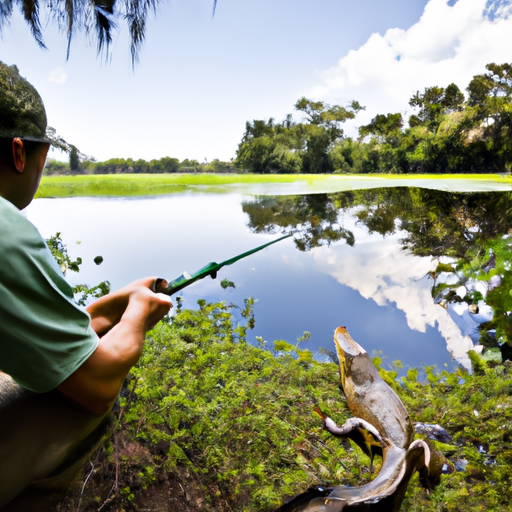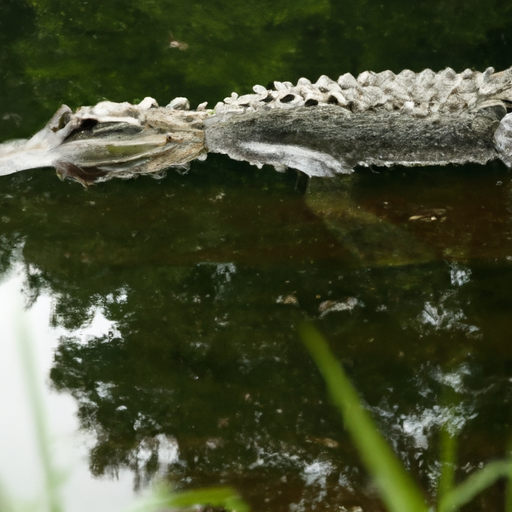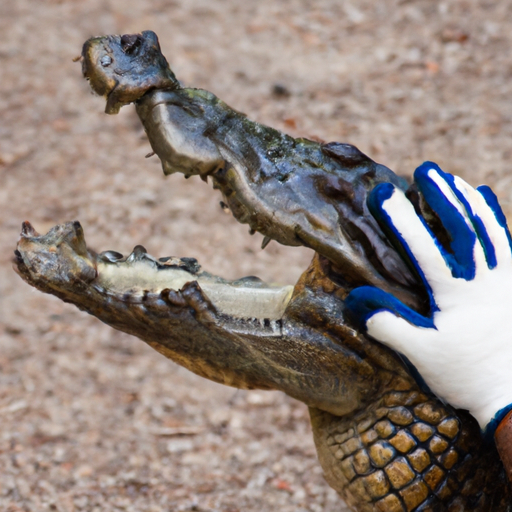So you’re planning a trip to Florida and you’ve always been intrigued by the idea of seeing alligators up close.
But here’s the burning question: can you actually feed these fearsome creatures in the sunshine state? Well, the answer might surprise you.
In Florida, it is illegal to feed alligators deliberately as it poses significant risks to both humans and the alligators themselves.
But why is this the case? Join us as we uncover the reasons behind this prohibition and explore why it’s best to leave the feeding to Mother Nature.
The Importance of Not Feeding Alligators
Potential Dangers of Feeding Alligators
Feeding alligators may seem harmless and exciting, but it comes with a range of potential dangers. One of the biggest risks is that it alters the natural behavior of these magnificent creatures. They start associating humans with food, which can lead to aggressive behavior when they come in contact with people who don’t have food to offer. This can result in attacks, injuries, and even fatalities.
Another danger of feeding alligators is that it disrupts their natural diet and feeding habits. Alligators are perfectly capable of finding their own food in their natural habitat. When they become accustomed to being fed by humans, they may become less motivated to hunt for their own food, leading to malnutrition and stunted growth.
Impact on Alligator Behavior
Feeding alligators can have a significant impact on their behavior. By providing an easy and reliable source of food, humans inadvertently encourage the alligators to lose their natural fear of humans. This can lead to closer and more frequent interactions between alligators and people, which is a recipe for disaster. Alligators that lose their fear of humans are likely to approach and even attack people who are not offering food, resulting in dangerous situations.
Furthermore, when alligators become accustomed to being fed by humans, they may become more aggressive in their pursuit of food. This heightened aggression can result in human-wildlife conflicts as alligators start to see humans as potential sources of food. This not only puts individuals at risk but also creates an unsafe environment for alligators themselves.
Illegal Activities and Consequences
Feeding alligators is not only dangerous, but it is also illegal in many regions, including Florida. State and federal laws have been put in place to prohibit feeding alligators to protect both humans and the alligators themselves. Violating these laws can result in penalties, fines, and even imprisonment.
In Florida, where alligators are prevalent, it is specifically stated that feeding alligators is a second-degree misdemeanor under Florida Administrative Code 68A-27.004(1). The law clearly states that “no person shall feed any alligator in the wild or place any food or other substances that will attract alligators to an area frequented by humans.” Violators can face fines of up to $500 and possible jail time.
It is essential to understand and respect these laws to ensure the safety of both humans and alligators, as well as to preserve the delicate balance of the ecosystem.
Understanding Alligator Diet and Feeding Habits
Natural Diet of Alligators
To comprehend why feeding alligators is unnecessary and potentially harmful, it is crucial to understand their natural diet. Alligators are carnivores and primarily feed on a diet that includes fish, turtles, birds, mammals, and invertebrates. They have evolved over millions of years to survive and thrive on this diverse range of prey.
Alligators are highly skilled hunters and have developed impressive adaptations to catch their prey. They are opportunistic ambush predators, patiently waiting in the water for the perfect moment to strike. Their powerful jaws and muscular bodies allow them to capture, incapacitate, and consume their prey efficiently.
Alligator Feeding Behavior in the Wild
When an alligator feeds in the wild, it follows a natural rhythm based on the availability of prey. They typically feed less during colder months when food is scarce and become more active during warmer periods when their prey is abundant. This natural ebb and flow enables alligators to maintain a healthy balance and adapt to the changing conditions of their environment.
Alligators have developed a keen sense of smell, making them highly efficient at detecting and locating prey. This ability allows them to find food sources without the need for human interference. By interfering with their natural feeding behavior, we disrupt the delicate ecological balance and potentially harm the alligators themselves.
Feeding Alligators: Common Misconceptions
False Belief #1: Alligators Need Human Help to Survive
One common misconception about alligators is that they rely on humans for survival. However, this couldn’t be further from the truth. Alligators have evolved over millions of years to obtain their own food and survive in their natural habitat. They are perfectly equipped to hunt, capture, and consume their prey without any interference from humans.
By providing alligators with food, humans disrupt their natural instincts and survival skills. This can have long-term consequences on alligator behavior and their ability to thrive in the wild. It is important to let nature take its course and allow alligators to rely on their own instincts to ensure their long-term survival.
False Belief #2: Feeding Alligators is a Form of Entertainment
Feeding alligators may seem thrilling and entertaining to some individuals, but it is a dangerous and irresponsible practice. It is essential to recognize that these are wild animals with their own natural behaviors and instincts. Interacting with them for personal amusement not only puts yourself at risk but also has negative consequences for the alligators and the delicate balance of the ecosystem.
It is crucial to prioritize the safety and well-being of both humans and alligators by refraining from engaging in feeding activities. Allowing alligators to live undisturbed in their natural habitat is the best way to appreciate them and ensure their continued existence.
Feeding Alligators and the Law
Florida State Laws Regarding Alligator Feeding
In Florida, where alligators are a common sight, feeding them is strictly against the law. The Florida Fish and Wildlife Conservation Commission (FWC) has established regulations to protect both humans and alligators. These regulations are in place for good reason – to safeguard public safety and preserve the natural behavior of alligators.
Under Florida Administrative Code 68A-27.004(1), it is clear that feeding any alligator in the wild or placing any food or substances that attract alligators to areas frequented by humans is prohibited. Violators of this law can face severe consequences, including fines of up to $500 and imprisonment.
It is important to respect these laws, not only to avoid penalties but also to ensure the well-being of both humans and alligators.
Federal Laws and Regulations on Alligator Feeding
In addition to Florida state laws, there are also federal laws and regulations in place regarding alligator feeding. The U.S. Fish and Wildlife Service (USFWS) is responsible for protecting and conserving alligators and their habitats throughout the United States.
Under the Lacey Act, it is illegal to possess, sell, or transport any wildlife, including alligators, in violation of state laws or regulations. This means that if feeding alligators is illegal in a specific state, it is also prohibited under federal law.
These laws and regulations reinforce the importance of not feeding alligators and serve as a reminder that our actions can have lasting consequences on wildlife populations and habitats.
The Negative Impact of Alligator Feeding
Adverse Effects on Alligator Health
Feeding alligators can have significant negative impacts on their health and well-being. When alligators are regularly fed by humans, they may become dependent on this artificial food source. This can lead to malnutrition and a weakened immune system, leaving them more susceptible to diseases and other health issues.
Additionally, when alligators become accustomed to being fed by humans, they may lose the motivation to hunt for their natural prey. As a result, their hunting and foraging skills deteriorate over time. This reliance on handouts disrupts their natural behavior and can make it difficult for them to survive in the wild without human intervention.
Ecological Consequences of Alligator Feeding
Feeding alligators not only impacts the alligators themselves but also has broader ecological consequences. Alligators play a crucial role in maintaining the balance of the ecosystem in which they live. They are top predators and help control the populations of their prey species.
When alligators are artificially fed by humans, the natural balance of the ecosystem is disturbed. The overpopulation of alligators can lead to a decline in the populations of other species. This imbalance can have cascading effects throughout the entire ecosystem, affecting the stability and health of the surrounding environment.
By refraining from feeding alligators, we can help preserve the delicate ecological balance and ensure the continued health and diversity of the ecosystem.
Interactions with Alligators: Safety Tips
Maintaining a Safe Distance from Alligators
When encountering alligators in their natural habitat, it is crucial to maintain a safe distance at all times. Respect the fact that alligators are wild animals and should not be approached or provoked. Keep in mind that alligators are powerful and fast, capable of running on land and swimming quickly in water.
To ensure your safety and the safety of the alligators, a recommended guideline is to maintain a distance of at least 30 feet from adult alligators and avoid any unnecessary risk or close proximity. Observing alligators from a safe distance allows you to appreciate their natural beauty while minimizing potential conflicts.
Proper Behavior Near Alligator Habitats
It is important to be mindful of your behavior when near alligator habitats to reduce the risk of dangerous encounters. Avoid swimming or allowing pets to enter bodies of water where alligators are known to reside.
Additionally, it is crucial to never intentionally attract alligators by throwing food or objects into the water. This behavior not only endangers yourself but also reinforces the dangerous association between alligators and humans.
By respecting their environment and maintaining a safe distance, you can coexist peacefully with alligators while minimizing potential risks.
Reporting Alligator Encounters
In the event of an alligator encounter that poses a safety risk, it is important to report it to the appropriate authorities. In Florida, incidents can be reported to the Florida Fish and Wildlife Conservation Commission’s (FWC) Nuisance Alligator Hotline at 1-866-FWC-GATOR. These reports allow wildlife professionals to assess the situation, mitigate potential risks, and ensure the safety of both humans and alligators.
By promptly reporting alligator encounters, we can help protect ourselves, others, and the alligators themselves.
Alternative Ways to Support Alligator Conservation
Understanding Alligator Conservation Efforts
While feeding alligators is detrimental to their well-being, there are alternative ways to support alligator conservation. Understanding the importance of their role in the ecosystem and the threats they face is the first step in contributing to their conservation efforts.
By educating yourself and others about alligators, their habitats, and the laws protecting them, you can raise awareness and promote responsible behavior around these incredible creatures. Sharing accurate information and debunking common misconceptions is essential in fostering a culture of coexistence and respect.
Donate to Alligator Conservation Organizations
Many organizations are dedicated to protect and conserve alligators and their habitats. Consider donating to these organizations to support their efforts in research, habitat conservation, and public education. Your contribution can make a meaningful difference in safeguarding the future of alligators and the ecosystems they inhabit.
Research reputable organizations such as The Alligator Foundation or local wildlife centers that focus on alligator conservation. When donating, ensure that the organization aligns with your values and has a proven track record of success in conservation efforts.
Spread Awareness and Educate Others
One of the most powerful ways to support alligator conservation is by spreading awareness and educating others. Share accurate information about alligators through social media, talks, or community events. By dispelling myths and promoting responsible behavior, you empower others to make informed decisions and contribute to the well-being of alligators.
Encourage your friends, family, and peers to respect the laws and regulations regarding alligator feeding, report dangerous encounters, and observe alligators from a safe distance. Through collective efforts, we can preserve the beauty and ecological importance of these remarkable creatures for generations to come.
Final Thoughts
Feeding alligators may seem tempting, but it is crucial to consider the potential dangers, legal implications, and ecological consequences.
Alligators are perfectly adapted to find their own food in the wild, and interfering with their natural behavior can lead to aggression, malnutrition, and ecological imbalances.
By understanding alligator diet and feeding habits, debunking common misconceptions, and respecting the laws in place, we can ensure the safety of both humans and alligators.
Practicing proper behavior near alligator habitats, reporting encounters, and supporting alligator conservation efforts are alternative ways to appreciate and preserve these magnificent creatures.
Let us remember that alligators are best admired from a safe distance, allowing them to fulfill their vital ecological roles undisturbed.
Together, we can protect and coexist with alligators while maintaining the delicate balance of our ecosystems.




